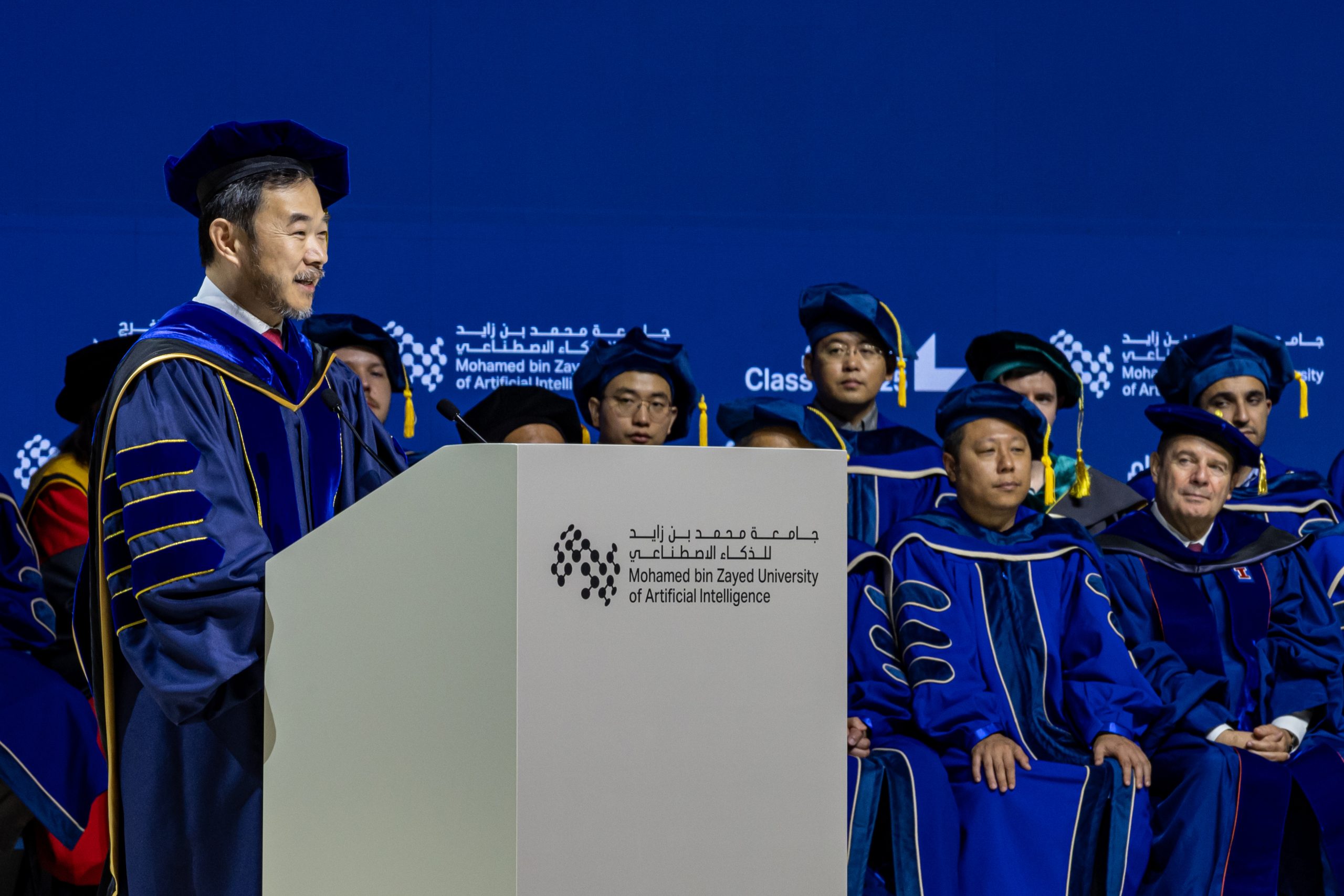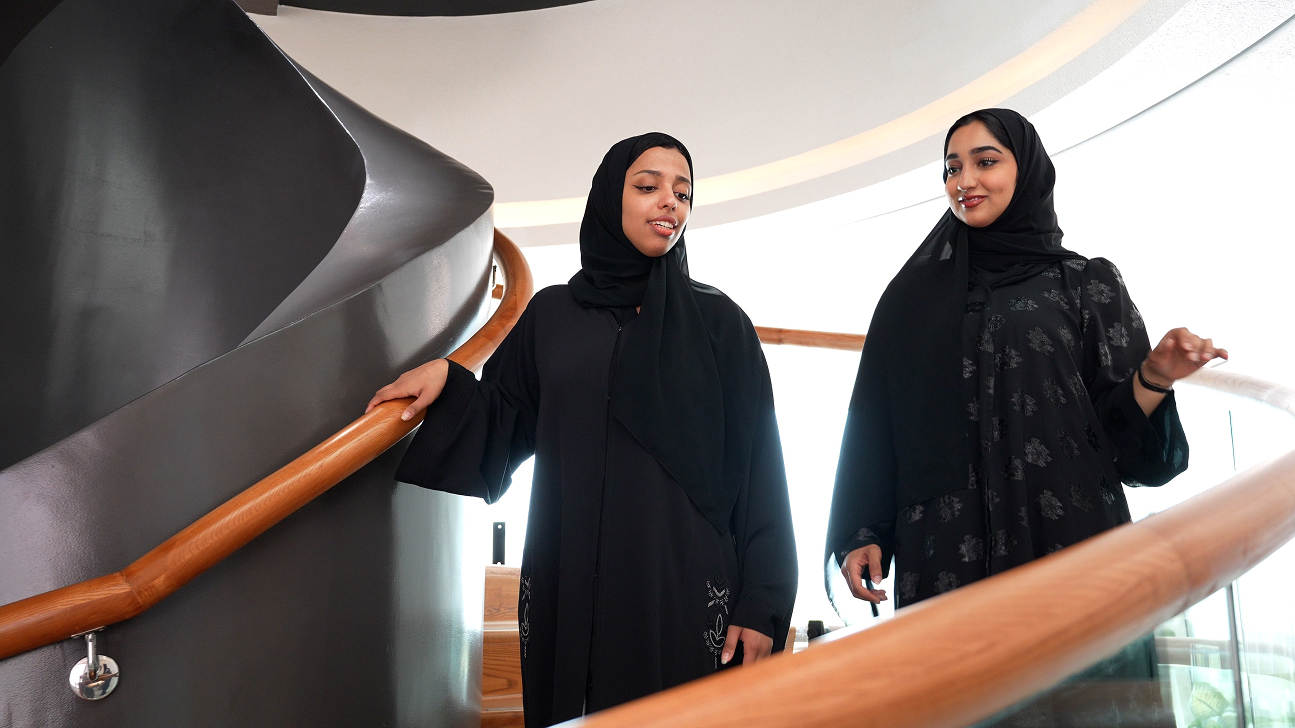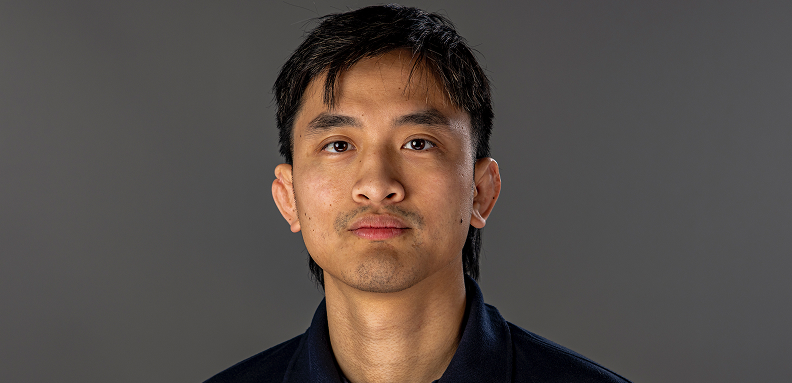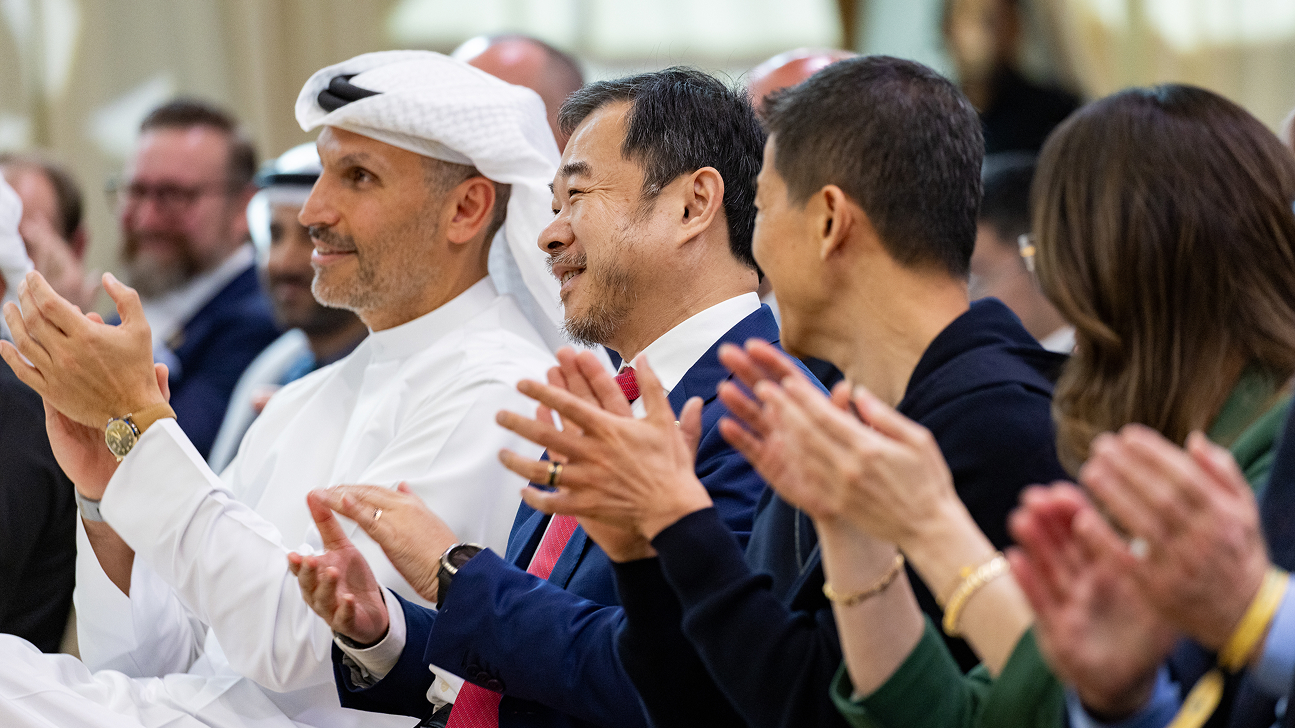President’s address to the Class of 2025
Wednesday, May 28, 2025

Navigating tomorrow’s seas: MENA, AI, and our collective future
MBZUAI President and University Professor, Eric Xing, delivered the President’s address to the Class of 2025 on 28 May, 2025, at Space42, Abu Dhabi.
Your Excellencies, distinguished faculty, honored guests, proud families, and most importantly, our 2025 cohort of graduates. I feel incredibly proud and inspired to see you take the stage and commence a major milestone in your lives.
Let me begin by thanking a number of important people who have made this achievement possible. First, I want to express my heartfelt gratitude and appreciation to our founding chairman, His Excellency Dr. Sultan bin Ahmed Al Jaber, for leading the University and guiding our growth during the first very important phase of establishment. Thank you Dr. Sultan for your unwavering support and tireless effort to make our dream possible.
And of course I’m very excited and grateful to welcome His Excellency Khaldoon Khalifa Al Mubarak as our new chair, who will lead us into a new phase of unprecedented growth and greater responsibility in supporting the nation’s development.
We stand today at the epicentre of history itself.
This year has been amazing. I’m sure you all remember the beginning of the year when we had the great honor to welcome the President of the UAE, His Highness Sheikh Mohamed bin Zayed Al Nahyan, who gave us his personal endorsement and support of the University’s vision and growth. And just a few weeks ago, U.S. President, Donald Trump, made his visit to the Middle East, with a particularly monumental stop in Abu Dhabi to unveil the establishment of the largest AI campus outside the United States.
I would argue that not since the dawn of the Industrial Revolution, nor the invention of the printing press, has humanity witnessed such a fundamental shift of global power in innovation. We used to talk about Florence, Great Britain and Silicon Valley during the Renaissance, the Industrial Revolution, and the Internet Age. But today everybody is talking about Abu Dhabi. President Trump’s visit to our region; the historic UAE-US AI partnership; the unveiling of the world’s largest AI campus outside the U.S. These are not merely business announcements – they mark a new era of transformation at the global scale.
When I think about these moments, I see something genuinely extraordinary happening. The centre of gravity for technological innovation – the very heartbeat of the global economy – is shifting beneath our feet: from Silicon Valley to the shores of MENA; from West to East; from what was to what will be.
And you, our graduates, are not here just to observe, but to architect this incredible transformation.
This is what I call ‘big time’. This is your moment. This is your calling. This is the tide that will define not just your career, but the trajectory of the global technological and socioeconomic landscape.
MENA is where the future lies, and AI is the foundation upon which that future will be built. As President of this University, I stand before you today not only with optimism, but with deep sense of admiration and pride for the scale of change we are witnessing – and what you are about to unleash upon the world.
Why I am proud? Because I know you will make a difference.
Are we ready for this fundamental change?
But I must ask – are we truly ready to be at the heart of such consequential change? Do we have the mindset, the courage, and the competence for such a role? Let me be very clear about what this requires:
First, we must have conviction. We must break free from established doctrine; welcome scepticism; embrace intellectual freedom, debate, and different opinions; and pursue meritocracy and excellence without apology. I would imagine that most people are genuinely fearful of challenging conventional wisdom. But look at history – every revolutionary advance in science has faced this same resistance. When Copernicus proposed his heliocentric model, when Einstein introduced the theory of relativity, when we began to understand quantum mechanics – each time, the public and even the scientific community initially reacted with scepticism or fear. Yet these ideas transformed our understanding of reality itself.
Convictions require courage. This is not just about daring to do something risky or dangerous, but about upholding and protecting fundamental principles and values without compromise. We must step out of our comfort zones. We must challenge ourselves, take on difficult problems, and be willing to change our minds. We must defend core academic principles that are built on facts, not ideology – on objectivity, not subjective sentiment – on open and civil debate, not cancelling dissent. This is non-negotiable. Remember, progress does not come from mere consensus – it comes from firm adherence to the principles of intellectual freedom, independent thinking, and fair competition.
Lastly, we need capabilities. We need new skills, purposeful reasoning, and results-driven approaches. We need agility – to be adept with entirely new tools. Technical skills may have expiration dates, but the human capacity for creativity, critical thinking, and adaptability are what make leaders and what get things done. This is timeless.
Avoiding the trap of self-referential thinking
On top of these three C’s, I really want to emphasise that we must obliterate what I call ‘self-referential thinking’. This is the greatest enemy of transformational progress – regressing new possibilities to old playbooks in the hope of making the old slightly better rather than breaking into a new spaces.
Let me explain with three examples:
- Somewhere on the internet I used to see a funny picture where a horse-and-carriage driver proudly replaced his horse with a Boston Dynamics robodog. I say, send your horse and carriage to the museum and go get a car or just take an airplane. That’s the more disruptive thing to do.
- Many times, I bump into CEOs who ask me to use AI to make every box in their org chart twice or three times more efficient. I say, why not use AI to design a new org-chart and reimagine the functionality of each box?
- Many doctors have asked me for new AI algorithms to build a better model on so-called ‘clean’ data collected from special cohorts, in order to understand diseases better. I say, all data – dirty or clean – are data. Use all of them without bias and tampering, and from all people with all diseases, so that you can understand the entirety of biology using AI foundation models.
This is what I mean when I say think out of the box. Do not be self-referential, assuming you know the problem and much of the issue, and only want some upgrades here and there. The purpose of AI isn’t to make better yesterday’s obsolete tasks or make better yesterday’s systems. It is to make possible yesterday’s impossibilities.
Just as the printing press did not just accelerate manuscript copying but democratized knowledge itself, AI does not just speed up computation – it democratizes intelligence; making the tools of genius available to all of us.
Live the future, not the past
As you prepare for your next chapter, I want to challenge how you think about your own trajectory. Do not let your past define your goals. Instead, let your aspirations be the guiding light for your journey, starting today.
When people come to me asking for a job, or to pitch for a project, they often start by saying: ‘My major was X, I’ve learned Y, I had experiences on Z, so I can do X+Y+Z – maybe multiplied by three.’ But if it were me, I would do it differently. I would start by asking: what is the problem to solve? What is the goal, regardless of whether I have experience? If I have experience, I can use it and go faster. If I don’t, I will simply go learn it from scratch.
This is what I mean by letting the goal guide you. I will not let my past define what I will do. I will let the goal be my North Star and build my way to get there.
That’s how I have approached every major chapter in my life. When I left China to pursue my education in the United States, I had limited early access to resources, but I did not allow this to define my possibilities. I believed that computational methods could transform biology, so I worked systematically and relentlessly towards realizing that vision. You probably know that before I was 30, I didn’t even know computer science. I started learning computer science at the age of 30, after completing several degrees before that. I felt like I needed the new knowledge to solve the problem I was hoping to solve. So I went to UC Berkeley and studied computer science from scratch. In five years, I became a professor at Carnegie Mellon, which led me to my current academic work on computational biology.
Another story is that when I accepted the role of President at this University, I wasn’t a seasoned administrator. But I had a vision: to build a new kind of academic institution in the MENA region in a transformative, disruptive way. To redefine the global AI world and put the UAE on the map of global AI competition. I took on the challenge. Even after four years, I’m still learning every day — but every day, I know I’ve grown into a better version of myself.
So, graduating class of 2025, let your vision define your path — not your resume.
The AI question everyone asks
Let me address the question that keeps policy makers and citizens awake at night: what if AI becomes smarter or more powerful than humans? Are we going to lose jobs? Is society going to become very dangerous?
I would say this question reveals a fundamental misunderstanding. Human intelligence and power have always relied on tools and technology. They are not static and sitting unchanged. Human intelligence has always been amplified by tools, such as writing, the printing press, electricity, and the internet. With AI, this amplification is taken to the next level.
I would say technology is like water, and human society is the boat sailing on this water. When the water rises, so does the boat. Today, AI is the rising tide. With AI, humans will become even smarter and more empowered.
Abandoning AI or stopping AI development is not wise, in my opinion. You only want to see that happen to your adversary – not to yourself or your friends.
When I observe global AI competition, I see two fundamentally different approaches to conflict. One approach focuses on stopping others from advancing, creating barriers, restrictions, and limitations. The other approach focuses on doing our own work faster and better. I would argue that this is the winning path.
The UAE-US partnership, with its massive data centre infrastructure and access to the world’s most advanced semiconductors, represents this second philosophy. We compete not through restriction but through innovation, through education, through creating ecosystems where the best ideas can flourish. Together, we will advance our region and our society to new heights.
MBZUAI’s vision for the future
At MBZUAI, we don’t want to be just another university. We aspire to become a new beacon institution of learning and innovation: one that combines the ambition and scale of big tech, and the rigor and openness of academia.
This synthesis is not just difficult: I would argue it will be painful and disruptive. It means disrupting the status quo and also dismantling some legacies. But the challenges faced by humanity, such as climate change, healthcare innovation, and sustainable development, demand such a fusion of insight and action. They require both fundamental research and practical application; theoretical understanding and entrepreneurial implementation.
And while in the current economy most attention is given to the applications and real-world impacts, I would advocate that in an era of exponential technological change, fundamental research becomes not just important but essential for our very existence and competitiveness. Throughout my career, I have witnessed how today’s theoretical breakthroughs become tomorrow’s industry standard. When we support basic science without demanding immediate applications, we plant seeds for innovations that cannot yet be imagined.
Your commission as explorers
As you graduate today, you don’t just enter a world where you stand at the threshold of change. You are the change itself.
The world needs people who combine technical expertise with ethical clarity, entrepreneurial drive with social responsibility, innovative thinking with reflective wisdom. This world needs you. You are not just receiving a degree today – you are accepting the responsibility to help guide human-AI collaboration in ways that strengthen rather than diminish human potential. This is what education in the age of AI must accomplish.
Congratulations, Class of 2025. You graduate at a moment of unprecedented technological change. You are equipped not just with knowledge but with the conviction, courage, and capability to lead in this new era.
This University will always remain your lighthouse. But today you must step forward to tackle challenges that no generation has faced before. You are entering a field where the fundamental problems remain unsolved. You will not follow established methodologies – you will develop new approaches that actually work. You are the engineers of tomorrow, building systems where human and artificial intelligence combine to solve problems that matter.
The future is yours to create. Set sail and explore.
- president ,
- graduation ,
- alumni ,
- Eric Xing ,
- commencement 2025 ,
- commencement ,
- Class of 2025 ,
- speech ,
- address ,
Related
MBZUAI launches Ruwwad AI Scholars Fellowship to build UAE’s next generation of AI faculty
The program will prepare Emirati Ph.D. graduates for future faculty careers by offering funded fellowships at leading.....
Read MoreAlumni Spotlight: driving AI transformation at a financial giant
MBZUAI alumnus Steven Hoang explains how he is using his master’s in machine learning to help shape.....
- student ,
- Alumni Spotlight ,
- finance ,
- alumni ,
- machine learning ,
MBZUAI marks five years of pioneering AI excellence with anniversary ceremony and weeklong celebrations
The celebrations were held under the theme “Pioneering Tomorrow: AI, Science and Humanity,” and featured events, lectures,.....
- ceremony ,
- celebration ,
- five year anniversary ,
- event ,
- board of trustees ,
- campus ,
- students ,
- faculty ,


